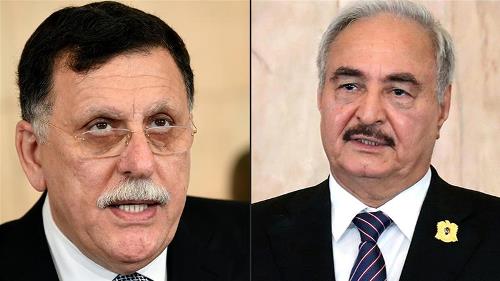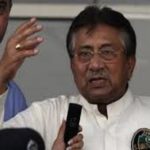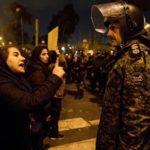The leaders of Libya’s two warring sides have arrived in Moscow for talks, a day after a ceasefire brokered by Russia and Turkey came into force.
The development on Monday came amid suggestions that Fayez al-Sarraj, the chief of the internationally recognized Government of National Accord (GNA), and his rival, renegade commander Khalifa Haftar, may sign the ceasefire agreement in the Russian capital.
Maria Zakharova, spokeswoman for the Russian foreign ministry, said the “inter-Libyan contacts” would be held “under the auspices of the foreign and defense ministers of Russia and Turkey”.
“Al-Sarraj, Haftar and representatives of other Libyan parties are expected to participate in these contacts,” she told reporters. It was still unclear if the two leaders would meet face to face.
Libya has been racked by turmoil since longtime leader Muammar Gaddafi was toppled in a NATO-backed uprising in 2011.
The oil-rich country has since been split between two rival administrations based in the country’s east and west amid a conflict drawing increasing involvement from foreign powers. Since April, the Tripoli-based GNA has been under attack from eastern forces loyal to Haftar, which on January 6 captured the strategic coastal city of Sirte.
The GNA and Haftar’s self-styled Libyan National Army agreed to a conditional truce called by Russia and Turkey that came into force at midnight local time on Sunday. Both warring sides have since accused the other of violations.
Reporting from Moscow, Al Jazeera’s Step Vaessen said the talks in the Russian capital were expected to go on for many hours.
She added that the aim of the meeting was “to put signatures under the ceasefire agreement”.
“There are reports that delegates from Egypt and also the United Arab Emirates will witness the ceremony here [in Russia],” she said.
“We don’t know when the signatures will be set, but we are expecting something today,” she added.
The ceasefire followed a joint call by Turkish President Recep Tayyip Erdogan – who backs al-Sarraj and has sent troops to help the GNA – and his Russian counterpart, Vladimir Putin, who analysts have long seen as supporting Haftar.
Pro-Haftar forces are supported by the United Arab Emirates, Saudi Arabia and Egypt. Al-Sarraj has also accused Paris of supporting Haftar and tacitly backing his assault on Tripoli, claims denied by French officials.
Earlier, Interfax cited Lev Dengov, head of the Russian contact group on Libya, as saying that al-Sarraj and Haftar would discuss “the possibility of signing a truce and the details of such a document”.
Separately, Khaled al-Mechri, head of Libya’s High Council of State, said the signing of the agreement in Moscow would pave the way for the revival of the political process in the country.
Al-Mechri told Al Ahrar TV that he would accompany al-Sarraj to Moscow, while Aguila Salah, speaker of the eastern-based parliament, would travel with Haftar.
Meanwhile, in a short televised speech on Monday, al-Sarraj called on Libyans to “turn the page on the past”.
“I call on all Libyans to turn the page on the past, reject discord and to close ranks to move towards stability and peace,” he said.
In an interview with Al Ahrar TV, al-Sarraj said on Monday the GNA had accepted the ceasefire deal to prevent more bloodshed in the country.
“We will not ignore the sacrifices of our sons and martyrs or our dream for a civil state,” he said. “Our acceptance of the cease-fire comes from a position of strength to maintain national and social cohesion.”
Al-Sarraj said his government forces, however, were ready “to resume military operations in case of any break to the ceasefire”.
More than 280 civilians and about 2,000 fighters have been killed and 146,000 Libyans displaced since Haftar launched his assault to seize Tripoli, according to the United Nations.













